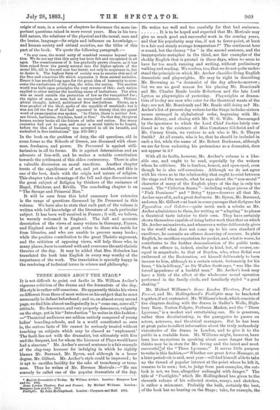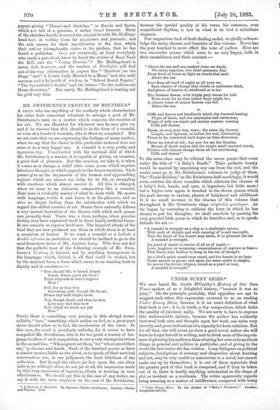THREE BOOKS ABOUT THE STAGE.*
IT is not difficult to point out faults in Mr. William Archer's vigorous criticism of the drama and the dramatists of the day. His style is rather self-conscious. He apparently thinks his views so different from those of most writers on his subject that he must necessarily be defiant beforehand ; and so, on almost every second page, we find him almost undiagnisedly in a "come one, come all," attitude. He denounces, and very properly denounces, vulgarity on the stage, yet in his "Introduction "he writes in this fashion : —" Theatrical audiences are seldom entirely composed of young ladies' boarding-schools, and in a world constituted as ours is, the serious facts of life cannot be seriously treated without touching on subjects which may be classed as unpleasant.' The fault lies not with the dramatist, but ultimately with Eve and the Serpent, but for whom the Licenser of Plays would have had a sinecure." Mr. Archer's second sentence is a fair example of the clap-trap humour for indulging in which he rightly blames Mr. Boman& Mr. Byron, and although in a lesser degree, Mr. Gilbert. Mr. Archer's style could be improved ; he is apt to sacrifice lucidity for the Bake of trenchancy or terse- ness. Thus he writes of Mr. Herman Merivale :—" He can scarcely be called one of the popular dramatists of the day.
* English Dramatists of To-day. By William Archer. London : Sampson Low and Co. 1882. Some limdon Theatre*. Post and Present. By Michael Wi!liams. London : Sampson Low and Co. 18E3.
Footlights. By John Hollingshead. London : Chapman sad Hall. 1883.
He writes too well and too carefully for that bad eminence.
It is to be hoped and expected that Mr. Merivale may give us much good and successful work in the coming years, and that his popularity may rise, if not to fever-point, at least to a fair and steady average temperature P" The sentiment here is sound, but the clumsy "for" in the second sentence, and the inappropriate metaphor in the third, are fair examples of the shoddy English that is printed in these days, when we seem to have far too much running and writing, without preliminary walking and reading. We confess, too, that we do not quite under- stand the principle on which Mr. Archer classifies living English dramatists and playwrights. He may be right in describing Mr. Browning as "a dramatist of the day after-to-morrow ; but we see no good reason for his placing Mr. Boucicault and Mr. Charles Reade beside Robertson and the late Lord Lytton as playwrights of yesterday. Playwrights or drama- tists of to-day are men who cater for the theatrical wants of the day ; are not Mr. Boucicault and Mr. Reade still doing so? Mr. Archer's list of present-day writers for the Stage includes sixteen names arranged in alphabetical order, beginning with Mr. James Albery, and closing with Mr. W. G. Wills. Encouraged by the ignorance to which the Lord Chief Justice lately con- fessed as to the existence of Miss Constance Gilchrist and of Mr. Corney Grain, we venture to ask who is Mr. S. Theyre Smith? At all events, who is he, that he should be included in such a list, while the name of Mr. Robert Buchanan, although we are far from endorsing his pretensions as a dramatist, does not appear in it
With all its faults, however, Mr. Archer's volume is a like- able one, and ought to be read, especially by the writers whom he criticises. He is fearless, honest, and open-eyed, even though he is also self-conscious. Although we do not agree with his views as to the relationship that ought to exist between the stage and the morals, what he says about the " non-moral " character of many of the English plays of the day is only too sound. The " Criterion drama "—including vulgar pieces of the "Pink Dominoes" and " Betsy " type—deserves all that Mr. Archer says of it, and a great deal more. Mr. Byron, Mr. Burnand, and even Mr. Gilbert—at least in some passages that disfigure his Pygmalion and Galatea—quite merit such a rebuke as Mr. Archer administers to them, for writing or " adapting " to please a theatrical taste inferior to their own. They have certainly shown themselves capable of doing better work than that on which Mr. Archer animadverts, and whenever a writer deliberately gives to the world what does not come up to his own standard of excellence, he commits an offence deserving of censure. In plain English, he sacrifices reputation for pocket, and, what is worse, he contributes to the further demoralisation of the public taste. Such an offence is, indeed, similar in kind, but, of course, un- equal in magnitude, to that of Dryden, who, when Belial was enthroned at the Restoration, set himself deliberately to burn incense to him, although to a certain extent, fortunately for his fame, "his indelicacy," as Sir Walter Scott says, "was like the forced impudence of a bashful man." Mr. Archer's book may have a little of the effect of the wholesome moral operation performed in the family circle, and familiarly styled "a good shaking."
Mr. Michael Williams's Some London Theatres, Past and Present, and Mr. Hollingshead's Footlights may be bracketed together,if not contrasted. Mr. Williams's book,which consists of five chapters dealing with the drama in Sadler's Wells, High. bury Barn, Norton-Folgate, Portman Market, and the "Three Lyceums," is a modest and entertaining one. He is generous, rather than discriminating, in the panegyrics he passes on actors, actresses, and theatrical managers. But he has been at great pains to collect information about the truly melancholy vicissitudes of the drama in London, and to give it to the public in a readable form. Mr. Williams might, however, have been less mysterious in speaking about some danger that he thinks may be in store for Mr. Irving and the latest and most successful:of the "Three Lyceums." It serves little purpose to write in this fashion,—" Whether our great Actor. Manager, at a later period—it is said, next year—will find himself able to take up the thread of popular interest at the point where he left it, remains to be seen ; but, to judge from past examples, the out- look is not, we fear, altogether unfraught with danger." The title of "Footlights," which Mr. Hollingshead has given to the eleventh volume of his collected stories, essays, and sketches, is rather a misnomer. Probably the bulk, certainly the best, of the book ha no bearing on the Stage; take, for example, the papers giving "Thumb-nail Sketches" in Russia and Spain, which are full of a genuine, if rather broad humour. Many of the sketches hardly deserved the original trouble Mr. Hollings- head too' r in writing them for magazines and journals ; and the sole excuse for their republication is the fact, which their author triumphantly states in his preface, that he has found a publisher. Does not everybody, at least everybody who reads a periodical, know by heart the stories of Bean Nash the M.C. and the "Young Roscius " ? Mr. Hollingshead is never dull, however, and the readers of Footlights will find oat-of-the-way information in papers like " Manfred ' on the Stage" and "A Gentle Lady Married to a Moor," and also mild sarcasm and a ha'porth of wisdom in "School Board Papers," "The Spendthrift's Guide," and the letters "To the (seldom-at) Home Secretary." But surely Mr. Hollingshead is beating out his gold very thin.



































 Previous page
Previous page